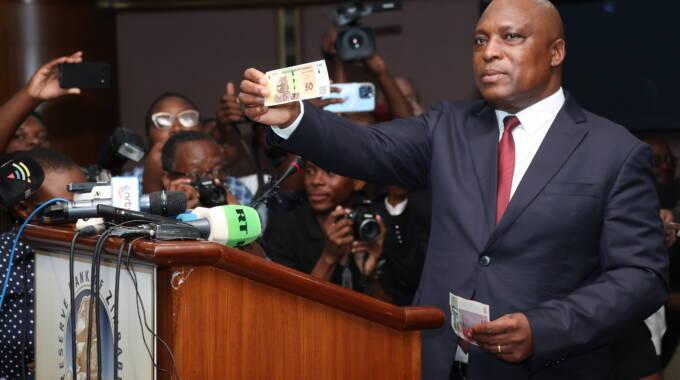ZiG is here, attention now on battling the ‘Ratchet Effect’
Zimbabwe’s monetary sphere was reset earlier this month with the Reserve Bank of Zimbabwe (RBZ) phasing out the Zimbabwe Dollar bringing in the new currency, Zimbabwe Gold (ZiG), but the country is still fragile on the value of the currency.
Fear on the street is that the value of the ZiG against the US Dollar is holding on temporarily and we will see big spikes starting to happen. The case is not being helped by parallel market traders who have already discounted the exchange rate.
The ZiG is reportedly trading at 18 ZiG to the dollar which is a 24,556 percent depreciation in 14 days. One might wonder what might be the cause, but before the new currency came, Zimbabwe Dollar was already awash in the streets leading to a high demand of foreign currency on the black market.
For this trend to not go out of hand, there is a need for the RBZ to stimulate the market with foreign currency so as to suck out the ZiGs lying around looking for foreign currency.
The reason why we are advocating for the RBZ to act swiftly, is because of past experiences which are as close as three weeks back with the Zimbabwe Dollar. In economics, there is a theory called the ‘Ratchet Effect’ where prices respond fast to rising inflation, but take a lag in responding to a fall in inflation.
A ratchet is a tool that only allows an object to move in one direction. For example, a car jack allows the user to ratchet the car up without it falling, so when aggregate demand increases, businesses respond quickly by raising prices.
However, businesses are slow to return to their lower prices when the inflationary pressure is removed.
Only after a prolonged period would management reduce their prices but with the ratchet effect limits or delays the effectiveness of using fiscal policy to combat inflation because businesses are slow to drop their prices.
The recent resurgence of the ratchet effect in the Zimbabwean foreign currency market has been particularly striking, with notable instances occurring following large injections of funds from government retentions and contractor payments.
Such injections, intended to alleviate liquidity shortages and stabilise exchange rates, paradoxically exacerbate market volatility, leading to a spiral of escalating rates that persist even as local currency liquidity diminishes.
Historically, we have witnessed analogous scenarios where the ratchet effect has wreaked havoc on foreign currency markets. In economies grappling with structural imbalances and capital flight, such as those in emerging markets, the ratchet effect often emerges as a consequence of short-term interventions aimed at shoring up currency reserves or financing government expenditures.
These interventions, though well-intentioned, inadvertently amplify market distortions, fueling speculative activities and eroding investor confidence.
The crux of the issue lies in the inherent asymmetry between currency injections and subsequent withdrawals.
When a substantial block of currency is introduced into the market, it triggers a surge in demand as market participants seek to capitalise on the newfound liquidity. However, once the initial influx subsides and demand outstrips supply, the market becomes vulnerable to sharp corrections, with parallel rates skyrocketing as participants scramble to secure scarce dollars for impending obligations.
Which is the case Zimbabwe has been facing in the past 5 years with the Zimbabwe Dollar.The case of government retention and contractor payments epitomises this phenomenon. These injections drive up parallel rates, and inadvertently create a reservoir of pent-up demand that remains latent until the next injection cycle.
Consequently, even as USD liquidity wanes, the market remains ensnared in a cycle of perpetual escalation, with rates leaping from one bullet payment to the next.
Moreover, the ratchet effect engenders a vicious cycle of market psychology, wherein heightened volatility begets further speculation and risk aversion.
Market participants, cognisant of the potential for abrupt rate spikes, adopt defensive strategies, exacerbating liquidity shortages and amplifying market gyrations. In this environment, rational economic behaviour gives way to herd mentality, exacerbating the destabilising effects of the ratchet mechanism.
For the RBZ, addressing the ratchet effect necessitates a multifaceted approach that addresses both structural deficiencies and behavioural biases.
Firstly, they must prioritise measures aimed at enhancing market transparency and reducing informational asymmetries. By promoting greater disclosure and standardisation of transaction data, the RBZ can mitigate speculative activities and foster a more efficient allocation of resources within the foreign currency market.
Secondly, efforts to bolster macroeconomic stability and address underlying imbalances are paramount.
Structural reforms aimed at enhancing export competitiveness, reducing fiscal deficits, and bolstering foreign exchange reserves can mitigate the need for ad-hoc currency interventions, thereby reducing the prevalence of the ratchet effect.
Lastly, regulatory measures aimed at curbing excessive speculation and enhancing market resilience can serve as a bulwark against the destabilising effects of the ratchet mechanism.
Through imposing prudent limits on leverage and enhancing market surveillance capabilities, regulators can attenuate the amplification of market shocks and promote greater resilience in the face of external pressures.
In conclusion, the ratchet effect represents a formidable challenge in the Zimbabwe foreign currency market, perpetuating cycles of volatility and undermining efforts to maintain exchange rate stability.
Addressing this phenomenon requires a coordinated effort encompassing structural reforms, enhanced transparency, and prudent regulatory measures.
Only through concerted action can the RBZ mitigate the destabilising effects of the ratchet mechanism and foster a more resilient and efficient global financial system.
Tapiwanashe Mangwiro
Tapiwanashe Mangwiro is a resident economist with the Business Weekly and writes this in his own capacity. @willoe_tee on twitter and Tapiwanashe Willoe Mangwiro on LinkedIn-ebusinessweekly










